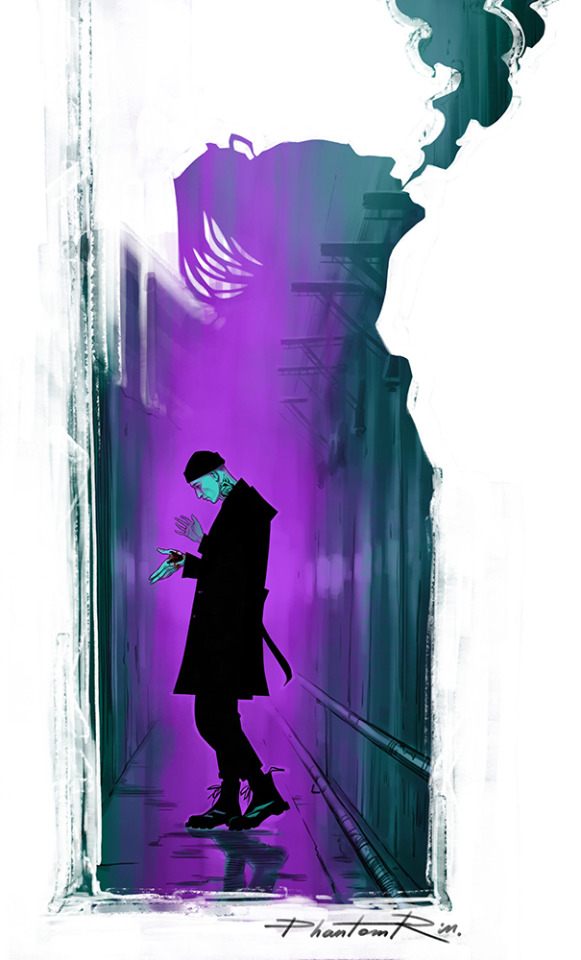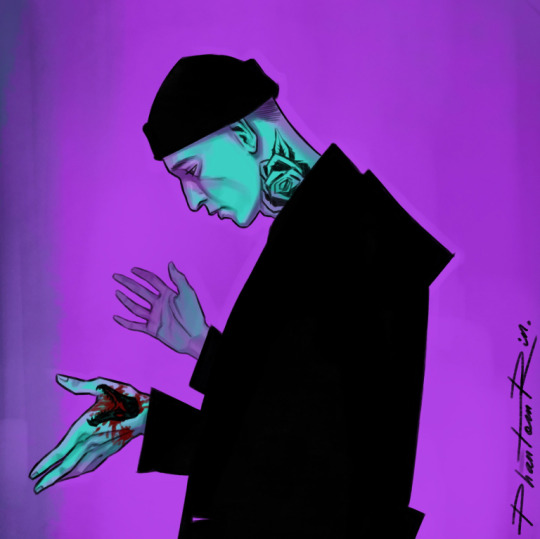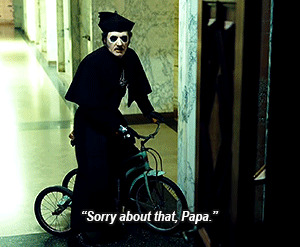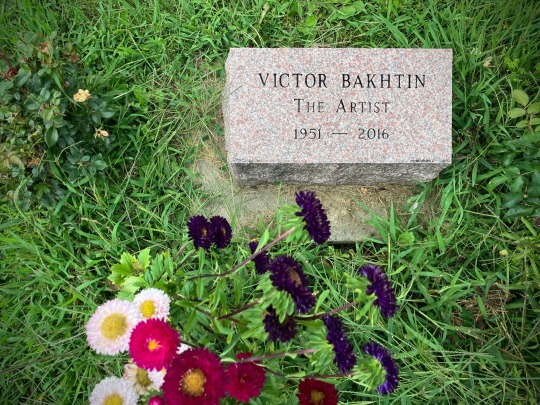#bakhtin
Explore tagged Tumblr posts
Text


Practice/fanart piece - inspired by Bakhtin's "Целовала" music video.
89 notes
·
View notes
Text
the carnivalesque and Ghost pt 1 of ???
"[The gaping mouth] is, of course, related to the lower stratum; it is the open gate leading downward into the bodily underworld. The gaping mouth is related to the image of swallowing, this most ancient symbol of death and destruction."' (p. 325)

"The medieval public centered its curiosity on [the gaping jaws], expecting the most amusing and comic protagonists to emerge from them." (p. 348)

13 notes
·
View notes
Text
Mikhail Bulgakov's novel, 'The Master and Margarita', can be regarded as a highly original literary illustration of Bakhtin's theory of the carnivalesque novel. ... The appearance of Woland in Moscow and the subsequent immersion of the Soviet capital in 'mirthful time and space' evoke death, injury, madness and destruction on a scale unknown in Goethe, but these events are meant to be perceived comically, since the victims are the representatives of human banality and vulgarity. ... this terror of carnival surpasses and paralyzes the usual and 'monologic' terror of the NKVD...
Nietzsche's Influence on the Non-Official Culture of the 1930s, Boris Groys
8 notes
·
View notes
Text
Дорога домой, несказанная
И нужная самая душе порой,
Она дурманная и долгожданная
Дорога, что ведет домой…

1 note
·
View note
Text
Паттайя
Паттайя, я в омуте рая Там дымят и не стесняются Днями и вечерами Паттайя, я, мили мотая Улетаю Только сердце на родине за морями Клубится туман, я не местный босяк В наушниках трек про какой-то косяк В режиме полета теперь телефон Несет лигалайза далекий вагон Немного другое лето Не надо красоток щупать Там между ногами это Желаю не перепутать Теплое море, погода “зе вэри найс” Настроение — “зе…
View On WordPress
0 notes
Text
True ambivalent and universal laughter does not deny seriousness but purifies and completes it. Laughter purifies from dogmatism, from the intolerant and the petrified, from fear and intimidation, from didacticism, from naïveté and illusion, from the single meaning, the single level, from sentimentality. Laughter does not permit seriousness to atrophy and to be torn away from the one being, forever incomplete. It restores this ambivalent wholeness. Such is the function of laughter in the historical development of culture and literature.
Mikhail Bakhtin, Rabelais and His World
118 notes
·
View notes
Text
Bakhtin's grotesque body, that is, the body in the culture of the carnivalesque, is characterized by fluidity rather than sharp, impermeable boundaries, by a blurring of the division between inner and outer.
—Ovid’s Metamorphic Bodies

#charles segal#mikhail bakhtin#severance 2.06#grotesque#boundaries#liminality#cw blood#reintegration#mark scout#mark s#gothic#severance#severance spoilers
26 notes
·
View notes
Text
still very much of the opinion that more people would appreciate pavel if they were able to look past the narrator's bias. the question of the narrator’s exact identity, ephemeral and shifting as it is, warrants consideration here as well.
#i made a tongue in cheek post about the narrator question in demons as well but#whether it’s dostoevsky himself (the whole time? perhaps only some of the time?)#or some amalgamation of the town itself#or some secret third thing in the vein of bakhtin’s uncontrollable characters theory#for all that the narrator loves alyosha they do not extend that same affection to pavel#(also interesting to consider how much of himself and his son he put into these two characters)#i suppose i’m separating narrator and narrative in my mind though bc i don’t believe you’re meant to#leave the story despising pavel. if anything i feel like it’s natural to feel the compassion for him that no one in the story could#i mean readers evidently feel it for ivan so why not his double?#the brothers karamazov#📘.txt#lit tag
24 notes
·
View notes
Text
Japanese Cultural Context and Its Dismissal With Regards to My Preferred Study of Final Fantasy VII
Shouldn't be any spoilers under the split, but the split is there for length.
Something that frustrates me when I point out that Journey to the West, Xiyouji, acts as a Bloomian precursor to Final Fantasy VII, intentional or not, is that a lot of people who are absolutely convinced that's impossible seem to fail to realize that Xiyouji is the major precursor to much of the most popular and influential Japanese media. When you think of the spikey-haired anime, manga, or JRPG protagonist who isn't quite human but loves or respects (usually coming to love or respect) his companions enough to use his immense power to protect them on a journey while negotiating the contradictions in his own being, you're thinking of an archetype laid out by interpretations of Xiyouji common to Japan from the '50s to the '80s. Popular examples of this archetype are Luffy from One Piece, Son Goku from Dragon Ball, and Naruto from Naruto. These range from adaptation (Son Goku), to negotiating with the work without relying on it (Luffy), to simply being inspired by so many works based on it that it recreates elements of the work anyway (Naruto).
Modern, popular anime, to continue discussing that sphere, came into being because of Xiyouji. When Osamu Tezuka's manga based on Xiyouji and heavily inspired by the 1941 Wan brothers' film Princes Iron Fan, My Son Goku (Boku no Son Goku, 1952-1959), was adapted into the film Alakazam the Great (Saiyuki, or Journey to the West in English) in 1960, it sparked Tezuka's interest in animation and directly led into Astro Boy's (Tetsuwan Atomu, 1952-1968) adaptation into an anime of the same name in 1963.
Ignoring that Tezuka's Astro Boy shares a lot of abilities and beats with Son Goku (from his bright eyes to his ability to discern good and evil to advance the plot, and begins to cement the archetype I mentioned above), My Son Goku and Alakazam the Great were popular and compelling enough to have their own influence outside of Tezuka's work. A lot of the metatextual humor and criticism in anime and manga can be traced back to My Son Goku, with even the title commenting on the story itself. Even Bowser, a villain from the Mario series that is distinctly not in a Bloomian precursor relationship with Xiyouji through the authors, was inspired by the Bull Demon King in Alakazam the Great before adopting a shell to go with his horns.
As the Bowser example kinda shows, people who make things don't do so in isolation. It would be difficult to do so, and it would be exceedingly difficult to be a fan of any kind of art in Japan from the late 1950s to the 1990s without coming into contact with something inspired by, adapting, or retelling Xiyouji.
Goku no Daiboken from Mushi Productions came out in 1967. NTV's Saiyuki aired from 1978 to 1980, but they also aired other Saiyuki media like their 1994 release. Akira Toriyama released Dragon Ball in 1984 and it received a Toei adaptation in 1986. In 1997 Enix was about to release its own Saiyuki manga.
That doesn't even include board game adaptations or uses of Xiyouji, card games with Xiyouji-themed cards or rules, reproductions of ehon adaptations of Xiyouji, Xiyouji children's books centered on Sun Wukong, use of Xiyouji in classrooms, video games like Capcom's SonSon in 1984, and on and on.
I think a big part of the push back I get on pointing this precursor nature of Xiyouji with Final Fantasy VII out over the past year is the wave of people playing Black Myth: Wukong or watching Overly Sarcastic Production's Journey to the West series and doing that "Guy who has only seen The Boss Baby" thing. Pointing out anything like the capture-rescue-recapture plot device, the focus on limits and breaking them, the spirituality inherent, or the ambivalent and multivalent nature of the protagonists connecting Xiyouji and Final Fantasy VII gets drowned out by people's feelings of being sick and tired of people going, "So I just got done watching the new BM:W trailer/playing BM:W and I was thinking..." Can't even start talking about Bloomian precursors or Bakhtinian chronotope before people disengage because of BM:W or the feeling that I'm being pretentious.
The other major part, that pretentious part, is that a lot of people have a dual-hatred of finding any depth in media they consider to be for children or for media from Japan in general. I don't have much to say about that, and I think that's a battle that's only just started in media. Just frustrating that saying, "I think this thing is doing something academics haven't really talked about much in Japanese media yet!" is drowned out by thought-stopping clichés becoming popular on the internet. "This is a Wendy's." "Put the fries in the bag." "Curtains are just blue." "Not that deep bro." "Just a silly JRPG."
With that said, I personally believe a deeper reading of Final Fantasy VII can be found in acknowledging this context. Cloud and Tifa can be read as sharing an expression of chronotope with Monkey and the Monk, with Cloud and Monkey moving and existing outside of the physical, human bounds of Tifa and the Monk. The capture-release-recapture structure is a huge part of both stories and is subverted to a degree with Tifa rescuing Cloud from self-capture on more than one occasion. There is even exploration of what can be read as heart-mind monkey in Final Fantasy VII with Cloud struggling against an indecisive and fractured mind, and I suggest that Cloud, Sephiroth, Zack, and Roche make up the elements of this heart-mind monkey in the same way that Monkey, the Sixth-Eared Macaque, the Bare-Armed Gibbon, and the Red-Buttocked Baboon do in Xiyouji with similar conclusions.
Oh well. As much as you can't stop people from writing fanfiction, you can't stop people from applying literary theory to the media they like. That is to say, I cannot be stopped unless I magically develop a platform and suddenly have academics in related fields telling me I am wrong. If M.J. Gallagher can suggest myths from across the globe impacted the game, I can suggest the narrative structure, characters, and even the UI itself (every character has a gold band of limits, something new to the series at the time) are deeply interacting with a text that has been immensely popular for readers and scholars in Japan since the late 1800s. That isn't a dig at him, but a confidence booster for me. I'm not even selling a book or speaking authoritatively to a large audience.
I'll probably return to more academically-minded posts after this, focusing more on the game than offhand discussion of discussion.
#ff7#ffvii rebirth#ffvii remake#final fantasy 7#ffvii#final fantasy vii#anime analysis#anime and manga#anime#manga#osamu tezuka#harold bloom#mikhail bakhtin#xiyouji#saiyuki#offhand analysis#video game analysis
11 notes
·
View notes
Text
Woke up still thinking about this Nickel Boys. It's really astoundingly good. Thinking like Stefania there are things re: interiority & novelistic perspective that I did not know could be conveyed through a cinematic medium--entirely through images, no voiceover, minimal dialogue, no exposition, all "showing," no telling, totally a synthesis between montage (film technique) and stream of consciousness (literary technique). The sequence when Elwood hears his grandmother mention Selma, then at breakfast the camera-eye looks down at his arm, at his skin, then an unremarkable street scene, but we notice for the first time, along with him, that some people are Black and some people are white, the dawning awareness of race makes us realize that all his previous memories take place in a self-contained, segregated, solely Black world he never questioned and never thought to question. There are so many other things to highlight but this is right at the beginning and stunned me because I did not know!!! Film could do that!!!
#And it successfully becomes polyphonic in its perspective between Turner and Elwood which is INSANE#Even more insane when you get to the end no spoilers#But like. It's a polyphonic film. In the Bakhtin sense. How did they do that. How did they DO that#Yes there's Rashomon but this isn't about competing memories of the same event#This is about simultaneous perspectives and fractured identity#It's CRAZY dawg#And it goes back and forth in time like crazy
7 notes
·
View notes
Text
Literally nothing gives me more imposter syndrome than a journal article/book chapter that casually throws around author-derived adjectives and half a page long philosophical quotes with 0 context
#I don't have time to read Marx Hegel Jung Freud Foucault Derrida Bakhtin and Nietzsche#just to understand 1 text about climate change#macks musings#phdblr
14 notes
·
View notes
Text
new url... nobody look at her yet she's new in town and still deciding on if she'll stay
#mikhail bakhtin save me. save me mikhail bakhtin#wait whos approaching... ITS KATHERINE DUNN WITH THE STEEL CHAIR!#<- jokes with a target audience of two people (+ my girlfriend is not on tumblr)#notnow
10 notes
·
View notes
Text
I'm going to do it guys. I'm going to read the chronotope essay. All 100+ pages of it
#^ said with a tone of unspeakable hubris but ah well#what was in the water in early 20th century russia that made them produce so much good linguistic theory#it's like. jakobson. bakhtin. voloshinov (provided he was also not just bakhtin). trubetzkoy#all hits no misses they weren't playing around#anyways i also want to read about carnivalism i think it might be relevant for the tobogan essay but we'll see#one thing at a time#perce rambles
4 notes
·
View notes
Text

8 August 2024 | Kingston Cemetery, Sauk County, Wisconsin
After taking pictures of all the grand monuments from the previous century, saw this humble marker and had to find out:
Who is Victor Bakhtin?
7 notes
·
View notes
Text
budala'da prens mişkin'in trajedisi, onun zayıf ve saf olmasından değil, tersine dünyanın onun saflığını kaldıramayacak kadar yozlaşmış olmasından kaynaklanır.
mikhail bakhtin - dostoyevski poetikasının sorunları
#kitap#edebiyat#blogger#felsefe#kitaplar#blog#kitap kurdu#milan kundera#bertolt brecht#mikhail bakhtin#dostoyevski#budala#prens mişkin#suç ve ceza#öteki#karamazov kardeşler#oblomov#çernişevski#anton çehov#nasıl yapmalı#hamlet#william shakespeare#terry eagleton#jean paul sartre#orhan pamuk#russian literature#mina urgan#nazım hikmet#ahmet altan#maksim gorki
2 notes
·
View notes
Text
cannot manage to remember it’s carnival no matter how many people i hear talking about it (or about purim coming soon which should also remind me)
2 notes
·
View notes